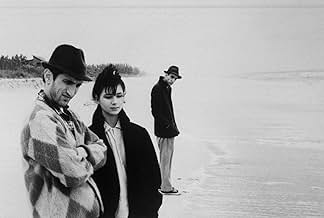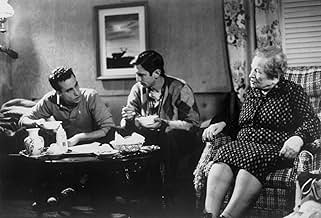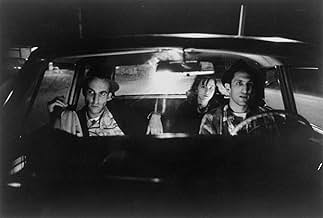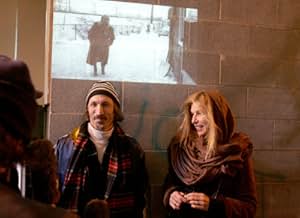A New Yorker's life is thrown into a tailspin when his younger cousin surprise-visits him, starting a strange, unpredictable adventure.A New Yorker's life is thrown into a tailspin when his younger cousin surprise-visits him, starting a strange, unpredictable adventure.A New Yorker's life is thrown into a tailspin when his younger cousin surprise-visits him, starting a strange, unpredictable adventure.
- Awards
- 8 wins & 2 nominations total
- Director
- Writers
- All cast & crew
- Production, box office & more at IMDbPro
7.442.8K
1
2
3
4
5
6
7
8
9
10
Featured reviews
10romper-2
Still good after all these years
I just finished watching Stranger Than Paradise on DVD - the first time I'd seen it since its year of release. I'd always recalled the film with fondness, although I could never remember why I liked it. Several years after seeing the movie I came across the John Lurie soundtrack and bought it without stopping to listen, and been slightly taken aback by it. The haunting pieces were more emotionally esoteric than I expected, and it took some time for the album to grow on me.
Seeing the movie again, I understand why. The only piece of popular music in the film is Screamin' Jay Hawkin's "I Put a Spell on You" and, although I had forgotten that it was there, I guess that I had expected the soundtrack to be more like those of mainstream movies and have songs and such-like. I think that Lurie's music is perfect in situ and, as I've said, the soundtrack has also grown on me as standalone pieces.
The movie itself is a masterpiece. The black and white images present a starkness and a clarity that heightens the alienation of self in a land that was supposed to be the new hope for immigrants from a decaying old world. Instead we see Eva walking through a deserted ghost world of New York where the graffiti says "Yankee go home". America is only a dream, a collective vision of a better world; paradise somewhere on earth.
As Willie and Eddie journey west after winning some money, we see that the supposedly beautiful city of Cleveland is cold and desolate with a frozen lake. The further trip to Florida ends in the middle of nowhere next to a bleak and windswept ocean. Paradise is still somewhere out of reach. I think that's why the movie appeals to me. It shows that the America of popular mythology - the home of the brave, land of the free, protector of the downtrodden, guardian of democracy in the free world - is merely a construct. Too many people these days believe in the child's fantasy of America being some paradise that Iraq and Afghanistan should emulate. Jarmusch reminds us that it is people who give meaning to a symbol, not the other way around. He allows for the ability of people to make their own meanings and evolve beyond the stagnation of popular culture.
At a time I originally saw this movie I had recently left home and got my first job, moving from the country to the city, and maybe to some extent I identified with Eva - moving from Budapest to America. It was also my first taste of grownup film, if I recall correctly, and confirmed me with a lifelong fascination with the cinema. I have a lot to thank Jim Jarmusch for.
Seeing the movie again, I understand why. The only piece of popular music in the film is Screamin' Jay Hawkin's "I Put a Spell on You" and, although I had forgotten that it was there, I guess that I had expected the soundtrack to be more like those of mainstream movies and have songs and such-like. I think that Lurie's music is perfect in situ and, as I've said, the soundtrack has also grown on me as standalone pieces.
The movie itself is a masterpiece. The black and white images present a starkness and a clarity that heightens the alienation of self in a land that was supposed to be the new hope for immigrants from a decaying old world. Instead we see Eva walking through a deserted ghost world of New York where the graffiti says "Yankee go home". America is only a dream, a collective vision of a better world; paradise somewhere on earth.
As Willie and Eddie journey west after winning some money, we see that the supposedly beautiful city of Cleveland is cold and desolate with a frozen lake. The further trip to Florida ends in the middle of nowhere next to a bleak and windswept ocean. Paradise is still somewhere out of reach. I think that's why the movie appeals to me. It shows that the America of popular mythology - the home of the brave, land of the free, protector of the downtrodden, guardian of democracy in the free world - is merely a construct. Too many people these days believe in the child's fantasy of America being some paradise that Iraq and Afghanistan should emulate. Jarmusch reminds us that it is people who give meaning to a symbol, not the other way around. He allows for the ability of people to make their own meanings and evolve beyond the stagnation of popular culture.
At a time I originally saw this movie I had recently left home and got my first job, moving from the country to the city, and maybe to some extent I identified with Eva - moving from Budapest to America. It was also my first taste of grownup film, if I recall correctly, and confirmed me with a lifelong fascination with the cinema. I have a lot to thank Jim Jarmusch for.
Absorbing Film By Jarmusch
An excellent example of why independent films are so invaluable, `Stranger Than Paradise,' written and directed by Jim Jarmusch, is a bare-bones production that never would have found the light of day in the mainstream. Essentially a character study, the story is a glimpse into the lives of three people: Willie (John Lurie); his cousin, Eva (Eszter Balint), recently arrived in New York from Hungary; and Willie's friend, Eddie (Richard Edson). After a couple of weeks in the Big Apple with Willie, Eva moves to Cleveland to live with their Aunt; a year later, Willie and Eddie are off to visit her. One thing leads to another, and the trio wind up in Florida (the designated paradise of the title). Watching this film is like spending time with some people you know; the characters are real people, so much so that watching them becomes almost voyeuristic, the camera somehow intrusive, exposing as it does the private lives of these individuals. It succinctly captures their lack of ambition, the ambiguity with which they approach life, and the fact that they seemingly have no prospects for the future beyond whatever a lucky day at the track affords them. The action, such as it is, is no more than what you would find in the average day of someone's life. The dialogue is what drives the film, though frankly, nothing they have to say is very interesting. And yet, this is an absolutely engrossing film; sometimes amusing, at times hilarious, but mesmerizing throughout. The performances are entirely credible, and again, you never have the sense that these are actors, but rather real people who happen to have had some moments from their lives filmed and presented to the audience for perusal. Jarmusch has an innate sense of capturing the essence of the everyday and transforming the most simplistic and mundane events into refreshingly documented, worthwhile viewing. It's an inspired piece of film making, helped to some extent by the stark black&white photography that adds to the realism of the overall proceedings. The use of brief blackouts during transitions works effectively, as well as providing the film with a unique signature. Original music is by Lurie, but the highlight is the use of the song `I Put A Spell On You,' by Screamin' Jay Hawkins, used recurringly throughout the movie, and which exemplifies that special touch Jarmusch brings to his projects. And there's a superb bit of irony at the end that really makes this gem sparkle. The supporting cast includes Cecillia Stark (Aunt Lotte), Danny Rosen (Billy), Tom DiCillo (Airline Agent), Richard Boes (Factory Worker) and Rockets Redglare, Harvey Perr and Brian J. Burchill (as the Poker players). `Stranger Than Paradise' may not be to everyone's liking, but to those seeking an alternative to the typical Hollywood big-budget fare available, it just may fit the bill and provide a satisfying, entertaining experience. I rate this one 8/10.
Ironic and Weird Tale of Emptiness and Boredom
The New World: The teenager Eva Molnar (Eszter Balint) arrives from Budapest, Hungary, and goes to the house of his cousin Willie, a.k.a. Bela Molnar (John Lurie) in a dangerous neighborhood in New York. Eva intends to travel to Cleveland to stay with her Aunt Lotte (Cecillia Stark), but the old woman is in the hospital and Eva has to stay with the idle Wille, who is absolutely indifferent to her. They spend their empty days smoking Chesterfield, watching television and playing solitaire and Eva befriends Willie's friend Eddie (Richard Edson). Then Willie and Eddie are connected to Eva and they miss her when she travels to Cleveland.
One Year Later: Willie and Eddie win a large amount in the poker game and they borrow a car and travel to Cleveland to visit Eva. They spend a couple of boring days in the house of Aunt Lotte.
Paradise: Willie and Eddie invite Eva to go on vacation in Florida. However they lose their money in the dog racing. Willie decides to bet their last money in the horse racing and they win money. Meanwhile Eva is wrongly taken by another woman and receives a large amount from a stranger. She leaves money for Willie and Eddie and goes to the airport expecting to travel to Europe, but there is only one flight to Budapest. Meanwhile Willie and Eddie seek her out in the airport. Will Willie find Eva?
"Stranger than Paradise" is an ironic and weird tale of emptiness and boredom by Jim Jarmusch, filmed in black and white and divided in three segments (acts). There are funny moments, like for example, when Willie has a phone conversation with his Aunt Lotte and tells that Eva will put his life on hold since the guy spends the days smoking, watching television, playing solitaire and gambling in the horse racing. Then he misses Eva, probably the only different thing that had happened in his boring and empty life. In the end, it is hilarious when Eddie asks to himself: What will Willie do in Budapest? "Stranger than Paradise" is not for every audience but those viewers that also enjoy cinema as art. My vote is eight.
Title (Brazil): "Estranhos no Paraíso" ("Stranger in the Paradise")
One Year Later: Willie and Eddie win a large amount in the poker game and they borrow a car and travel to Cleveland to visit Eva. They spend a couple of boring days in the house of Aunt Lotte.
Paradise: Willie and Eddie invite Eva to go on vacation in Florida. However they lose their money in the dog racing. Willie decides to bet their last money in the horse racing and they win money. Meanwhile Eva is wrongly taken by another woman and receives a large amount from a stranger. She leaves money for Willie and Eddie and goes to the airport expecting to travel to Europe, but there is only one flight to Budapest. Meanwhile Willie and Eddie seek her out in the airport. Will Willie find Eva?
"Stranger than Paradise" is an ironic and weird tale of emptiness and boredom by Jim Jarmusch, filmed in black and white and divided in three segments (acts). There are funny moments, like for example, when Willie has a phone conversation with his Aunt Lotte and tells that Eva will put his life on hold since the guy spends the days smoking, watching television, playing solitaire and gambling in the horse racing. Then he misses Eva, probably the only different thing that had happened in his boring and empty life. In the end, it is hilarious when Eddie asks to himself: What will Willie do in Budapest? "Stranger than Paradise" is not for every audience but those viewers that also enjoy cinema as art. My vote is eight.
Title (Brazil): "Estranhos no Paraíso" ("Stranger in the Paradise")
"I put a spell on you..."
Stranger Than Paradise, which put filmmaker Jim Jarmusch on 'the map' in the small but superlative crop of independent filmmakers of the eighties (he was the first, then came the Coen Brothers, then Spike Lee, and then culminating in the 90's with the 'new wave' of independent filmmakers). What he presents here is a unique little treatise on youth, on the subtle and disconnected qualities that go in life when you don't have much to do. In a way it's an existentialist film without many very serious questions to deal with story or even character-wise (except until maybe the last fifteen minutes in the "Paradise" segment). Like a French New-Wave film, to which Jarmusch was heavily influenced by (i.e. the gorgeous, grainy black and white photography by Tom DiCillo), he leaves more for the audience to ponder, as they go along on their journey.
One of the things that Stranger Than Paradise has going for it is a sort of realism that, like and not-like a Wes Anderson film for example, is off-beat. Only here it is more of an urban sort of landscape and interiors that Jarmusch gives us with, along with its three principles. John Lurie as Willie is very good at having attitude when he needs it, but in reality is rather low-key in his 'hip-ness'. His cousin from Hungary pays him a visit (Eszter Balint as Eva, maybe too low-key at times, though appropriately observant of foreign territory). There is also his faithful companion Eddie, played in a great supporting tone and style by Richard Edson. The first segment of the film deals with her in New York. The second one has Eddie and Willie go to Cleveland to pay Eva a visit. Then in the third segment they go down to Florida to have some fun, only to have anything but.
In other words, those looking for a film where a lot of things 'happen' may be disappointed, or just bored. I've seen the film twice now, and on the first viewing I was a little detached from what was going on on screen, which is just little things going on with the characters, like one would see in everyday life. But on the second viewing I somehow connected more with these characters, the youth that seem to drift needlessly along. The editing of the film is also the most simplistic, though highly effective, in adding to the disconnected quality of Jarmusch's direction- no cuts during dialog, just fading to black, fading up, fading to black, fading up (Jarmusch would continue this with Down by Law and Dead Man, though not as frequent or strategic).
In fact, the whole film is rather deliberate in its style, but as the song that plays several times in the film "I Put a Spell On You" from Screamin' Jay Hawkins plays, it does work to bring a viewer in...or not. Like many in the "art-film" world, almost all of Jarmusch's films are either liked or not, and I think that's appropriate for his stories, which often deal with low-key characters dealing with unusual but either realistic or metaphorical situations. One thing I can say for certain, much like the French new-wave films inspired by it, it's imitated, but not equaled in its form.
One of the things that Stranger Than Paradise has going for it is a sort of realism that, like and not-like a Wes Anderson film for example, is off-beat. Only here it is more of an urban sort of landscape and interiors that Jarmusch gives us with, along with its three principles. John Lurie as Willie is very good at having attitude when he needs it, but in reality is rather low-key in his 'hip-ness'. His cousin from Hungary pays him a visit (Eszter Balint as Eva, maybe too low-key at times, though appropriately observant of foreign territory). There is also his faithful companion Eddie, played in a great supporting tone and style by Richard Edson. The first segment of the film deals with her in New York. The second one has Eddie and Willie go to Cleveland to pay Eva a visit. Then in the third segment they go down to Florida to have some fun, only to have anything but.
In other words, those looking for a film where a lot of things 'happen' may be disappointed, or just bored. I've seen the film twice now, and on the first viewing I was a little detached from what was going on on screen, which is just little things going on with the characters, like one would see in everyday life. But on the second viewing I somehow connected more with these characters, the youth that seem to drift needlessly along. The editing of the film is also the most simplistic, though highly effective, in adding to the disconnected quality of Jarmusch's direction- no cuts during dialog, just fading to black, fading up, fading to black, fading up (Jarmusch would continue this with Down by Law and Dead Man, though not as frequent or strategic).
In fact, the whole film is rather deliberate in its style, but as the song that plays several times in the film "I Put a Spell On You" from Screamin' Jay Hawkins plays, it does work to bring a viewer in...or not. Like many in the "art-film" world, almost all of Jarmusch's films are either liked or not, and I think that's appropriate for his stories, which often deal with low-key characters dealing with unusual but either realistic or metaphorical situations. One thing I can say for certain, much like the French new-wave films inspired by it, it's imitated, but not equaled in its form.
A seductive character and mileu study
Reading over the comments so far, it seems that most people think this film is great, with a rare few criticizing it for being a boring 'student-film'.
People, this is for sure not a film for those who've been brutalized by too much Hollywood cinema - it's a quiet movie that you absorb slowly. It's very well done and quite absorbing. Sure it makes me think of so-called student-films (my brother is in film school), but that's not to say it's not a damn good one. There's something to be said for beautiful photography (the black and white images go so well with the feelings of emptiness and coldness) and the search for a meaning in life. These people are desperately in need of meaning and affection, none of which they seem to be able to find - or give. This is a movie about that desperate search.
And it's well worth seeing - for those with a bit of patience and artistic sensibility. It's a movie about emptiness for sure, but is by no means 'boring'. I'd give it 4/5 stars.
People, this is for sure not a film for those who've been brutalized by too much Hollywood cinema - it's a quiet movie that you absorb slowly. It's very well done and quite absorbing. Sure it makes me think of so-called student-films (my brother is in film school), but that's not to say it's not a damn good one. There's something to be said for beautiful photography (the black and white images go so well with the feelings of emptiness and coldness) and the search for a meaning in life. These people are desperately in need of meaning and affection, none of which they seem to be able to find - or give. This is a movie about that desperate search.
And it's well worth seeing - for those with a bit of patience and artistic sensibility. It's a movie about emptiness for sure, but is by no means 'boring'. I'd give it 4/5 stars.
Did you know
- TriviaDirector Jim Jarmusch was dismayed to discover all the money he paid for the rights to Screamin' Jay Hawkins' "I Put a Spell on You" went to the record company, with nothing going to Hawkins himself. When the film earned a profit, Jarmusch took it upon himself to track down Hawkins (who was living in a trailer park, at the time) and give him some money. It was the beginning of a friendship that lasted until Hawkins' death. According to Jarmusch, Hawkins continuously swore he'd pay him back, despite Jarmusch's insistence that the money was a gift.
- GoofsWhen Eddie and Willie are driving to Cleveland, the camera and camera operator can be seen in the reflection of the rear view mirror.
- ConnectionsEdited from Stranger Than Paradise (1983)
- SoundtracksI Put a Spell on You
Written by Screamin' Jay Hawkins (as Jay Hawkins)
Used by permission of CBS Unart Catalog, Inc.
All Rights Reserved.
Performed by Screamin' Jay Hawkins
Courtesy of CBS Records
- How long is Stranger Than Paradise?Powered by Alexa
Details
- Release date
- Countries of origin
- Languages
- Also known as
- Extraños en el paraíso
- Filming locations
- Production companies
- See more company credits at IMDbPro
Box office
- Budget
- $90,000 (estimated)
- Gross US & Canada
- $2,436,000
- Gross worldwide
- $2,454,393
- Runtime
- 1h 29m(89 min)
- Color
- Aspect ratio
- 1.85 : 1
Contribute to this page
Suggest an edit or add missing content

































